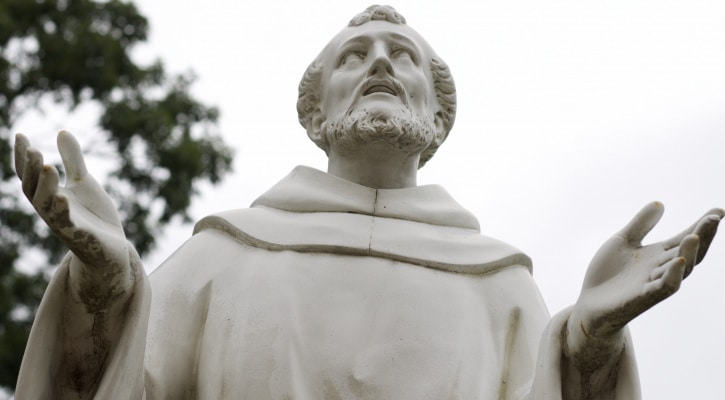The Feast of Pardon, as it is called in Italy, always attracts thousands of visitors and pilgrims to Assisi. According to legend and later historical fragments, St. Francis of Assisi persuaded Pope Honorius III to grant a plenary indulgence to all those who visited the Portiuncula on August 2 and confessed their sins.
It was on this date that the little church was dedicated under the patronage of St. Mary of the Angels. The Portiuncula, or Little Portion, is the cradle of the Franciscan Order, established as its headquarters by St. Francis himself. The Feast of Pardon has been celebrated there with great ceremony through the centuries. Knowing that the basilica, damaged by the 1997 earthquake, will still be open for this year’s feast reminds me once again of the blessings I received there just a few years ago.
Immediately after the early morning Mass, another friar and I set out from Rome for Assisi. For the first time, I would celebrate this feast of reconciliation in the city of Francis. In Assisi, Francis himself had experienced the pardon of the Lord, proclaimed God’s goodness and invited others to conversion at the Portiuncula. We planned to visit the little chapel within the Basilica of St. Mary of the Angels in the valley below Assisi and spend the rest of the day in the city.
Shortly after nine a.m. we arrived at our destination. The small chapel, one of the three churches repaired by the young Francis, had been all but abandoned in the wooded plain below Assisi in the 13th century. Now it is preserved in the center of the large basilica. That sacred place which was so dear to Francis that he asked the brothers never to leave it, that holy ground where Francis asked to be brought as he lay dying, continues to call countless pilgrims to prayer and to celebrate the Feast of the Pardon of Assisi.
I knelt on the stone floor and, with head bent, prayed in silence. As I emerged from the chapel and walked toward my friend, I was struck by the large number of people waiting to go to confession. At least 20 friars were hearing confessions, but long lines of people stood everywhere waiting to confess.
A Leading of the Heart
In an instant I changed my plans. My head might have questioned, but my heart now directed me. Without hesitation, I asked one of the friars if I could help with confessions. A bit surprised but very grateful for my offer, he thanked me and immediately went to set up two chairs in front of a side altar.
“Francis loved this spot more than any other in the world….It was here that he made such extraordinary progress” —St. Bonaventure
I apologized to my waiting friend for my change in plans and for leaving him alone for the day. While he thought I was crazy, he respected my decision to stay and hear confessions. We agreed to meet outside the basilica around 5:30 p.m. to witness the youth celebration before heading back to Rome.
I placed a stole over my habit, sat down and began to hear confessions as a long line of penitents immediately gathered. After I had been hearing confessions for an hour or so, I caught sight of another friar friend. Though a member of the Assisi province, he was studying in Rome. We had become friends over the years, having met when he was studying theology in Assisi. He did not look in my direction—or so I thought.
Minutes later he appeared at my side, between confessions, to ask if I was staying for lunch. When I said yes, he suggested that we meet in the sacristy at 12:30 since pranzo (the afternoon meal) would begin at 12:45. I agreed.
The basilica is closed from 12:30 to 2:30 daily, as is the custom throughout Italy. The two of us spoke excitedly as we moved through the ancient corridors and across the cloistered courtyard, quietly slipping into the full and festive refectory where the first-course plates were already being cleared. We hastened to prepare ourselves a plate of pasta and seat ourselves.
I couldn’t imagine a more joyous celebration of the feast. The meal, especially the pasta, was eccellente! I sat in the company of my brothers, happy to celebrate with them this Franciscan feast and truly grateful to share lunch with a good friend.
Even more than the meal, my brothers or my friend, the experience of the morning’s confessions filled me with an inexplicable joy and inner peace. Rarely had I heard so many confessions. Never had I sat hearing confessions for over three hours continuously in Italian. Yet I wasn’t tired. I felt overwhelmed with joy and peace, excited being at the Portiuncula for the feast and humbled by hearing the confessions of such faith-filled people.
Making My Own Peace
After our meal, my friend and I went for a walk in the ancient, cloistered courtyard. We moved slowly round and round its perimeter. I asked him to hear my confession. Though initially reluctant, when he heard me explain that I wanted to express my sinfulness before one who knew me, he agreed. I prayed, confessed my sins and listened to his counsel. He prayed with me and absolved my sins. We exchanged a blessing of peace and parted. A profound peace flooded my being.
As I wound my way back through the corridors, I prayed in gratitude for the gift of the day. I returned to the basilica not to work but again to sit on holy ground, again to pray in that sacred place, once again to proclaim, to witness and to celebrate the mercy of God.
Then, out of the hundreds in my line of penitents, there emerged one who would touch my very depths. I cannot remember the color of his hair, the shape of his face or the sound of his voice. Yet that penitent would so witness for me the transforming power of God’s love that I remember his very soul, that experience of grace.
A Repentant Drug Dealer
Before me sat a man I guessed to be in his early 20’s, a young man with bowed head, an anonymous penitent who began (in Italiano), “Bless me, Father—” He faltered, whispering that he did not even know how long it had been, just that it had been years. I assured him that it did not matter how long it had been. It mattered only that he was there. I spoke with him about God’s love. I asked him to remember God’s promise of forgiveness and then to speak whatever sins he wanted to confess. He fell silent, head in hands.
I waited, not wanting to pressure him, trying to allow him the time he needed. Several times he started to stammer but fell again into silence.
Finally, he shook his head as if to say no and began to raise himself from the chair. As I looked into his tear-filled eyes, my heart went out to him in his pain. Gently I touched his arm, hoping to convey my concern and to encourage him to speak. He sat again. Tears started to stream down his face as he blurted out that God could never forgive him.
He cried as he spoke about his sinfulness, how worthless a person he was, how he had hurt others, how he hated what he had done and who he was. He kept repeating that God could not forgive him as he mentioned some of his sins and, with voice drifting off, added, “vendendo le droghe.” I asked him to repeat his last phrase. Appearing somewhat startled, he began to apologize for having spoken so quickly that I hadn’t been able to understand.
If not my looks, certainly my accent betrayed that I was a foreigner. I tried to assure him that I thought I had understood, but asked again that he repeat his last phrase. Slowly, deliberately, gazing into my eyes, he repeated, “vendendo le droghe.” He had said what I thought I had heard: “selling drugs.” I had wanted to be sure.
His head fell, his eyes avoiding my gaze. He blurted out the feelings behind his tears—worthlessness and shame. He had done evil things for money. He had hurt children by selling drugs. How could God forgive him? How could anyone ever forgive him, love him, even look at him?
His tears became a torrent. I wanted only to listen lovingly, to pray with him honestly and sincerely, to minister to him God’s forgiveness. I reached out and took his hands in mine. Slowly, hesitantly, he raised his head and looked into my eyes.
‘When I Was in Sin…’
As I held the hands of one who hated his very being, as I listened to a man who described his whole life as worthless, as I looked through my own tears upon the face of one who had come to the Portiuncula seeking the mercy of God, I saw before me another Francis. I saw before me not a 13th-century Francis but a desperate young man seeking to change his life. I saw not the merchant’s son seeking a knight’s glory and imprisoned in Perugia but rather a wayward son seeking self-glory and imprisoned by his own self-hatred. I saw not the Francis who in his Testament had written, “When I was in sin, the Lord led me…,” but the Francis before me who had been led by the Lord to sit there and to pray, “Bless me, Father….”
Whence the image of Francis? It did not come from me. It came to me as gift in that moment of grace. The image presented itself and, informed by that vision, I began to speak with “my” Francis. I explained that centuries before a young man from Assisi, who later would be revered throughout the world, who touched countless lives through his gentle being, spoke similar words.
That same Francis, also in his early 20’s, sought to change the way he lived. He too felt worthless and separated from God. He too felt that he was “no good,” speaking in his Testament about his entire life before his conversion as “when I was in sin.”
I explained that we do not know why Francis so devalued his former life. I wondered aloud if Francis had perhaps killed someone in battle or felt overwhelmed by his own participation in war where so many lives had been lost. I explained how the details did not matter, but only that Francis thought of himself as worthless, that he experienced his own profound sinfulness.
Like the young man before me now, Francis too felt worthless, alone, hating who he had become. Yet he came to know more profoundly God’s mercy, God’s forgiveness and love. I spoke about how Francis had wanted everyone to know God’s goodness and abundant love, how he had asked the pope specifically for this special indulgence so that people would be assured of God’s forgiveness, could celebrate God’s love and begin again to serve the Lord.
At times my Francis looked into my eyes and watched my tears. At times, he bowed his head and sobbed. I continued to speak to my Francis about Assisi’s Francis. I told him how Francis’ vision of his own life changed, how he turned to God and began to see people and all of creation differently, how it all began with him realizing that he was “in sin” but that God loved him. I reminded him that the God who had led Francis among the lepers had led him here to the basilica. God, who had shown mercy to this Francis, had already touched his heart in leading him to seek forgiveness. As St. Francis had done, so too could he now turn from sin and seek to follow in the footprints of the Lord.
A prayerful, teary silence followed. Then he spoke. Tears again streamed down his face, but now he cried tears of joy. With a peaceful exuberance, he spoke about feeling new, cleansed, hopeful. He started to describe hopes and dreams. He wanted to change his life, to abandon all that had been and to find a way to help people.
The Miracle of Forgiveness
I don’t know how long we talked. I do know that we were on sacred ground, in a holy place. The voice which had spewed self-hatred now reflected an inner peace. The eyes which had evidenced only pain and despair now sparkled with hope.
I witnessed the miracle of forgiveness. Before my eyes, grace transformed his soul. I beheld the power of grace opening his heart, healing his wounds, calling him forth. He now believed that even he could be forgiven by God.
He started to express thanks. I wondered aloud about my being there: the last-minute invitation, the change in plans, the chance that he should be in my line, the image of Francis given me. I expressed my belief that all is grace.
Your Own Little Portion
Hours later my friend appeared in the basilica and signaled for my attention. After many more confessions, I was able to break away and accompany him outside to witness the sea of young people gathered in the piazza.
Having been inside all day, I was surprised and delighted at how beautiful the late afternoon seemed. My friend reiterated that he thought I was crazy for hearing confessions all day and missing such a glorious day in Assisi. I smiled.
As we began our journey home, I tried to describe my celebration of the Feast of Pardon. For me, the whole day had been a gift. I could not have imagined a better celebration. He remained unconvinced. We rode for a while in prayerful silence. As I remembered the day, my heart filled with gratitude and I broke out in song, my friend joining me in singing Francis’ great canticle.
I suspect that words suffice only for those who have themselves glimpsed this experience of grace. Perhaps words speak most clearly to the hearts of those who have known the transforming power of God’s forgiving love.
Perhaps you will see beyond my young Francis, my moment in the basilica, to moments in your own life which have been times of grace, times when someone turned from being “in sin” to begin a new life in Christ. I hope you will be touched and blessed, know it to be holy ground, a sacred place. May you too visit a Portiuncula of your own to celebrate the feast of pardon, the gift of grace.








